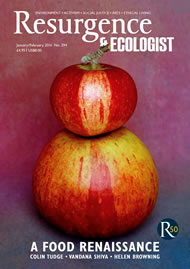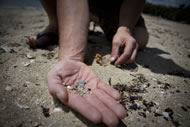The California State Senate has passed a bill that bans the use of plastic microbeads in cosmetic and personal hygiene products such as shampoos, soaps, toothpaste and skin exfoliating scrubs, to be in force from 2020, Kara Moses writes.
Similar bans have been proposed in other states but have been less stringent than California’s new bill to comprehensively ban all synthetic microbeads regardless of whether companies claim they will eventually degrade.
Debate continues around loopholes for ‘biodegradable’ plastic, which has been shown to degrade only in certain conditions, which are not found in the marine environment. Environmentalists are equally concerned about the risks they pose as about the standard plastic beads, but unlike the Californian legislation, other statewide bans have excluded them.
Microbeads are small enough to pass through filtration systems, allowing them to find their way into waterways and oceans in effluent from waste-water treatment plants. Researchers have estimated that 808 trillion microbeads are washed down drains in the United States each day, with 8 trillion dumped into waterways in effluent – enough to cover more than 300 tennis courts.
Once in the natural environment, they absorb toxic chemicals, and they enter the food chain because aquatic wildlife mistakes them for food and ingests them. Toxins can become increasingly concentrated as they move up the food chain, and can eventually find their way back to humans in the consumption of seafood.
“We cannot afford to wait any longer to end microplastic pollution. The cost to the environment and wildlife is much too great,’’ said Democrat Richard Bloom, the author of the bill.
Microbeads are a small part of a major problem of growing concern: that of plastic pollution in aquatic environments. Most notable is the Great Pacific Garbage Patch, a highly concentrated accumulation of largely plastic debris in the North Pacific Ocean. The total microplastic (0.33–4.75mm diameter) load of the North Pacific Ocean alone has been estimated at 35,000 tons.
A recent survey found 300,000 tons of plastic floating in the oceans worldwide, without including plastic floating in the water column, or that has sunk to the sea floor or been washed up on shores. Plastics do not biodegrade or dissolve, instead breaking into increasingly tiny pieces, persisting in the environment for hundreds of years.
Scientists in the US are now calling for an outright federal ban on microbeads.







